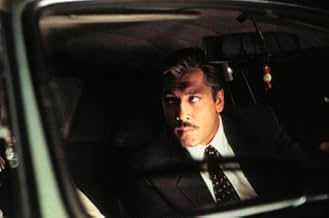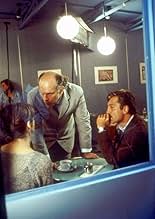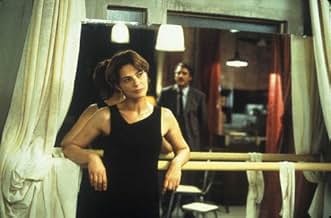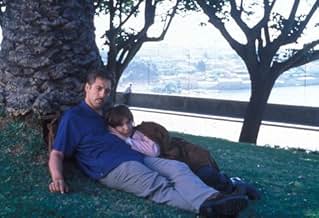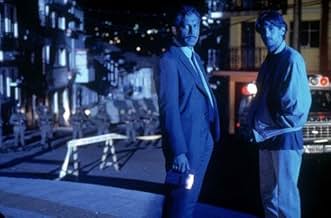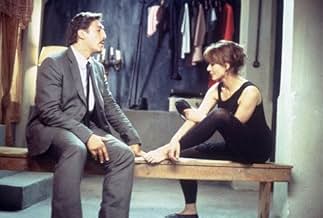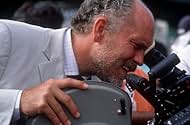IMDb RATING
6.8/10
7.2K
YOUR RATING
A police detective in a South American country is dedicated to hunting down a revolutionary guerilla leader.A police detective in a South American country is dedicated to hunting down a revolutionary guerilla leader.A police detective in a South American country is dedicated to hunting down a revolutionary guerilla leader.
- Awards
- 1 win & 3 nominations total
Featured reviews
Acclaimed actor John Malkovich has made his directorial debut with an assured political thriller that combines tension and intelligence to make for a gripping two and a quarter hours. The setting is a South American country which is unnamed, but the clear inspiration for the storyline is the early 1990s experience of Peru (which I have recently visited) when the bizarre Abimael Guzman led the murderous Shining Path movement, while the movie was shot in Spain, Portugal and Ecuador.
Javier Bardem plays Augustin Rejas, a former lawyer turned policeman who manages rare dignity and honesty as he battles with the interventions of a regime teetering on the edge of a military dictatorship and the pursuit of a fanatical revolutionary codenamed Ezekiel, while struggling with the varying emotions associated with a vapid wife, an adoring daughter, and his daughter's dance teacher, the eponymous and allurring woman upstairs (Laura Morante as Yolanda). Bardem - who reminds me of an early Raul Julia - gives a languid yet charismatic performance and hopefully we will see much more of this talented actor.
In some respects the work is reminiscent of Costa-Gavras's "State Of Siege", a clip of which is actually used here. However, the movie is based on a novel by the British writer Nicholas Shakespeare, who wrote the screenplay which features some conversation in Quechua (a native language of Peru and Bolivia), and this is a more personal examination of terrorism than the 1973 movie.
Javier Bardem plays Augustin Rejas, a former lawyer turned policeman who manages rare dignity and honesty as he battles with the interventions of a regime teetering on the edge of a military dictatorship and the pursuit of a fanatical revolutionary codenamed Ezekiel, while struggling with the varying emotions associated with a vapid wife, an adoring daughter, and his daughter's dance teacher, the eponymous and allurring woman upstairs (Laura Morante as Yolanda). Bardem - who reminds me of an early Raul Julia - gives a languid yet charismatic performance and hopefully we will see much more of this talented actor.
In some respects the work is reminiscent of Costa-Gavras's "State Of Siege", a clip of which is actually used here. However, the movie is based on a novel by the British writer Nicholas Shakespeare, who wrote the screenplay which features some conversation in Quechua (a native language of Peru and Bolivia), and this is a more personal examination of terrorism than the 1973 movie.
The film's trailer, which rain endlessly for months in advance at my local art house, and the reviews, etc., have emphasized this as a political thriller. But in fact it's really in the tradition of "Casablanca," where politics is a constant background to only part of the hero's motivation. I did expect someone to say "Round up the usual suspects!"
Awkwardly in this day and age, the Latino actors in the film's unnamed Latin American country (it was filmed in Ecuador and Madrid) all speak (accented) English, with subtitles to indicate when characters are speaking an Indian dialect, i.e. when the hero lawyer/detective is using his heritage to solve the complex case of politically-motivated murders.
But it's the complex layers that make this more interesting than Costa-Gavras' didactic "State of Siege" that is repeatedly referred to as an inspiration, both to director John Malkovich and the revolutionaries, and making this akin to HBO's "The Wire" in showing how a flawed cop can stick to his professionalism amidst deadly-serious bureaucratic and real politics.
The cop's simplistically drawn Beverly Hills matron-type wife turns out to incidentally help him uncover a clue, as he gradually comprehends the cynicism of a revolution that uses unexpected types of cells for suicide missions, with resonance for the MidEast as well, as ideologues are more diabolically dangerous than criminals.
That the dancer is actually downstairs is emblematic of the film's genre confusion.
Awkwardly in this day and age, the Latino actors in the film's unnamed Latin American country (it was filmed in Ecuador and Madrid) all speak (accented) English, with subtitles to indicate when characters are speaking an Indian dialect, i.e. when the hero lawyer/detective is using his heritage to solve the complex case of politically-motivated murders.
But it's the complex layers that make this more interesting than Costa-Gavras' didactic "State of Siege" that is repeatedly referred to as an inspiration, both to director John Malkovich and the revolutionaries, and making this akin to HBO's "The Wire" in showing how a flawed cop can stick to his professionalism amidst deadly-serious bureaucratic and real politics.
The cop's simplistically drawn Beverly Hills matron-type wife turns out to incidentally help him uncover a clue, as he gradually comprehends the cynicism of a revolution that uses unexpected types of cells for suicide missions, with resonance for the MidEast as well, as ideologues are more diabolically dangerous than criminals.
That the dancer is actually downstairs is emblematic of the film's genre confusion.
Having seen "Being John Malkovich" recently, I expected a lot from "The Dancer Upstairs" and I have to admit that I really was enchanted by it. Even though it never says which country in South America this story is based on, it's clear that it must be Peru. There just are too many references to the rebel movement The Shining Path, president Fujimori... But it's good that it never says that it is actually Peru. There are more South American dictatorships, more rebel movements...
It tells the story of an ex-lawyer who has become police officer, because he wanted justice to be done in the right way. He has to hunt down and arrest a revolutionary guerilla leader, but as he digs deeper, he'll find out that more people are actually supporting the rebels than he thought, even the people that he never suspected...
What I liked so much about the movie is the way it portrays everything. It doesn't fear to show the violence committed by both sides, but also shows the beautiful side of the country (its landscapes, its culture,...). Some say this is clearly a right-wing movie and that Malkovich is right wing as well. What has the political preference of the director to do with it? This movie isn't right-wing, nor is it left-wing. It clearly shows both sides, giving you the police detective who works for the right-wing government, who falls in love with the left-wing activist.
If there is one remark that I have to make, than it must be the fact that the actors didn't speak in Spanish. Now they had some weird Spanish-English accent. But all the rest was really very good. I give it an 8.5/10.
It tells the story of an ex-lawyer who has become police officer, because he wanted justice to be done in the right way. He has to hunt down and arrest a revolutionary guerilla leader, but as he digs deeper, he'll find out that more people are actually supporting the rebels than he thought, even the people that he never suspected...
What I liked so much about the movie is the way it portrays everything. It doesn't fear to show the violence committed by both sides, but also shows the beautiful side of the country (its landscapes, its culture,...). Some say this is clearly a right-wing movie and that Malkovich is right wing as well. What has the political preference of the director to do with it? This movie isn't right-wing, nor is it left-wing. It clearly shows both sides, giving you the police detective who works for the right-wing government, who falls in love with the left-wing activist.
If there is one remark that I have to make, than it must be the fact that the actors didn't speak in Spanish. Now they had some weird Spanish-English accent. But all the rest was really very good. I give it an 8.5/10.
It's Latin America in the Recent Past. Agustín Rejas (Javier Bardem) is a Sergeant manning a road check. The country is corrupt with a militaristic Presidency. Rejas is a former lawyer ready for a promotion in the capital. A mysterious man with others and a dead dog in a truck escape the checkpoint. Then it's five years later. He's a police Lieutenant. With his young partner Sucre (Juan Diego Botto), he's investigating a mysterious revolutionary group led by Ezequiel. They hang dogs from the lamp posts. The violence escalates as leaders get assassinated. Yolanda (Laura Morante) is Rejas' daughter Laura's dance teacher. He begins an affair with her as he suspects her connection to Ezequiel.
The non-specificity of the time and place could have been improved by weaving the real story into this movie. It doesn't have to be perfect and most movies aren't real biographies anyways. The great aspect of this is Bardem and the sense of Latin America that this projects. John Malkovich is directing for the first time and he shows some competency. It is well-made and most importantly, he focuses on Bardem. The story does leave some questions. The ballet teacher's connections to everyone is very convenient. The investigation is not that clear. I don't know how nebulous the book is but adapting may have left something out of the movie. It would help to have great clarity, and better intensity.
The non-specificity of the time and place could have been improved by weaving the real story into this movie. It doesn't have to be perfect and most movies aren't real biographies anyways. The great aspect of this is Bardem and the sense of Latin America that this projects. John Malkovich is directing for the first time and he shows some competency. It is well-made and most importantly, he focuses on Bardem. The story does leave some questions. The ballet teacher's connections to everyone is very convenient. The investigation is not that clear. I don't know how nebulous the book is but adapting may have left something out of the movie. It would help to have great clarity, and better intensity.
I would expect a movie directed by John Malkovich to be intense and specific. The Dancer Upstairs is that. It is a political movie that while popular in Europe, does not tend to draw well in the United States. Too bad.
The story tells the tale of a lawyer who has left the law looking for a better system. I don't know that becoming a police detective is that much better, but it serves the story. The story is set in a nameless Latin American country -- which also suits the story line.
Detective Lt. Agustín Rejas (Javier Bardem) has left a law firm where he was a junior partner, to join law enforcement -- with a conscious. He can give a break to a traveler whose papers are not quite right and he can be relentless in his pursuit of a terrorist.
Rejas has been victimized by the politics of his country. His father lost his coffee farm to the soldiers. His view of the judicial system has seen a rapist become president of the country. But still, Rejas finds joy in his beautiful dancer daughter and his wife -- who has a political mission of her own. Then he meets the free spirited dance instructor for his daughter.
Rejas works in a corrupt society where the fiscal corruption goes hand in hand with the moral and political corruption. The central government is all too ready to suspend civil rights and to put military law into effect. The military killing innocent people is fine as long as it suits the party.
Rejas attempts to live the just life and must deal with the corruption the best he can. This conflict is the heart of the movie. As he says, he has feelings about his father losing his farm and he is the Gary Cooper type.
Javier Bardem is excellent in the pivotal role. Juan Diego Botto does a very credible job as Detective Sgt. Sucre. Laura Morante is intoxicating as dance instructor focal point of the story.
I give this move a 9 for great story and suspense, excellent direction and fine acting. There is no sex and very brief nudity. The violence does tend to be horrific and there are depictions of cruelty to animals -- both central to the plot. This is far less than the typical Jason or Chainsaw movies gore.
I consider this an excellent direction debut for John Malkovich and look forward to his next feature film effort. It feels like Malkovich will fill a role similar to Robert Redford in films he has directed.
The story tells the tale of a lawyer who has left the law looking for a better system. I don't know that becoming a police detective is that much better, but it serves the story. The story is set in a nameless Latin American country -- which also suits the story line.
Detective Lt. Agustín Rejas (Javier Bardem) has left a law firm where he was a junior partner, to join law enforcement -- with a conscious. He can give a break to a traveler whose papers are not quite right and he can be relentless in his pursuit of a terrorist.
Rejas has been victimized by the politics of his country. His father lost his coffee farm to the soldiers. His view of the judicial system has seen a rapist become president of the country. But still, Rejas finds joy in his beautiful dancer daughter and his wife -- who has a political mission of her own. Then he meets the free spirited dance instructor for his daughter.
Rejas works in a corrupt society where the fiscal corruption goes hand in hand with the moral and political corruption. The central government is all too ready to suspend civil rights and to put military law into effect. The military killing innocent people is fine as long as it suits the party.
Rejas attempts to live the just life and must deal with the corruption the best he can. This conflict is the heart of the movie. As he says, he has feelings about his father losing his farm and he is the Gary Cooper type.
Javier Bardem is excellent in the pivotal role. Juan Diego Botto does a very credible job as Detective Sgt. Sucre. Laura Morante is intoxicating as dance instructor focal point of the story.
I give this move a 9 for great story and suspense, excellent direction and fine acting. There is no sex and very brief nudity. The violence does tend to be horrific and there are depictions of cruelty to animals -- both central to the plot. This is far less than the typical Jason or Chainsaw movies gore.
I consider this an excellent direction debut for John Malkovich and look forward to his next feature film effort. It feels like Malkovich will fill a role similar to Robert Redford in films he has directed.
Did you know
- TriviaThe story is inspired by the Maoist insurgency in Peru known as the Shining Path. Its leader Abimael Guzmán, who was known by the nom de guerre President Gonzalo, was captured in an apartment above a ballet studio in the capital city of Lima in 1992. The ballet teacher Yolanda was based on Maritza Garrido Lecca, the woman in whose apartment Guzmán was found. Bardem's character was inspired by Benedicto Jimenez and Gen. Antonio Ketin Vidal, the leading figures responsible for Guzmán's capture.
- GoofsWhen Sucre & Llosa arrest the young woman in orange, she has been handcuffed to the ceiling of the car. But then en route, soldiers simply drag her out of the backseat. No handcuff keys. No bolt cutters.
- Quotes
Agustín Rejas: I'd like to have a list of staff with access to the President's chambers.
Calderón: Luckily there are only two of them. The first is named 'Fuck', the second is named 'Off'.
- Crazy creditsThe producers would like to thank ... the residents of Narcisos Street ...
- ConnectionsFeatured in Revealing 'the Dancer Upstairs' (2003)
- SoundtracksViagens Interditas
(1995)
Written by Pedro Malgheas (as Pedro Ayres) and Rodrigo Leão
Performed by Madredeus
Licensed by Dpte. de Productos Especiales de
(p) EMI Odean, S.A., Madrid, Spain, 2001 exclusive rights holder
- How long is The Dancer Upstairs?Powered by Alexa
Details
Box office
- Gross US & Canada
- $2,377,348
- Opening weekend US & Canada
- $106,142
- May 4, 2003
- Gross worldwide
- $5,227,348
- Runtime
- 2h 12m(132 min)
- Color
- Sound mix
- Aspect ratio
- 1.85 : 1
Contribute to this page
Suggest an edit or add missing content



